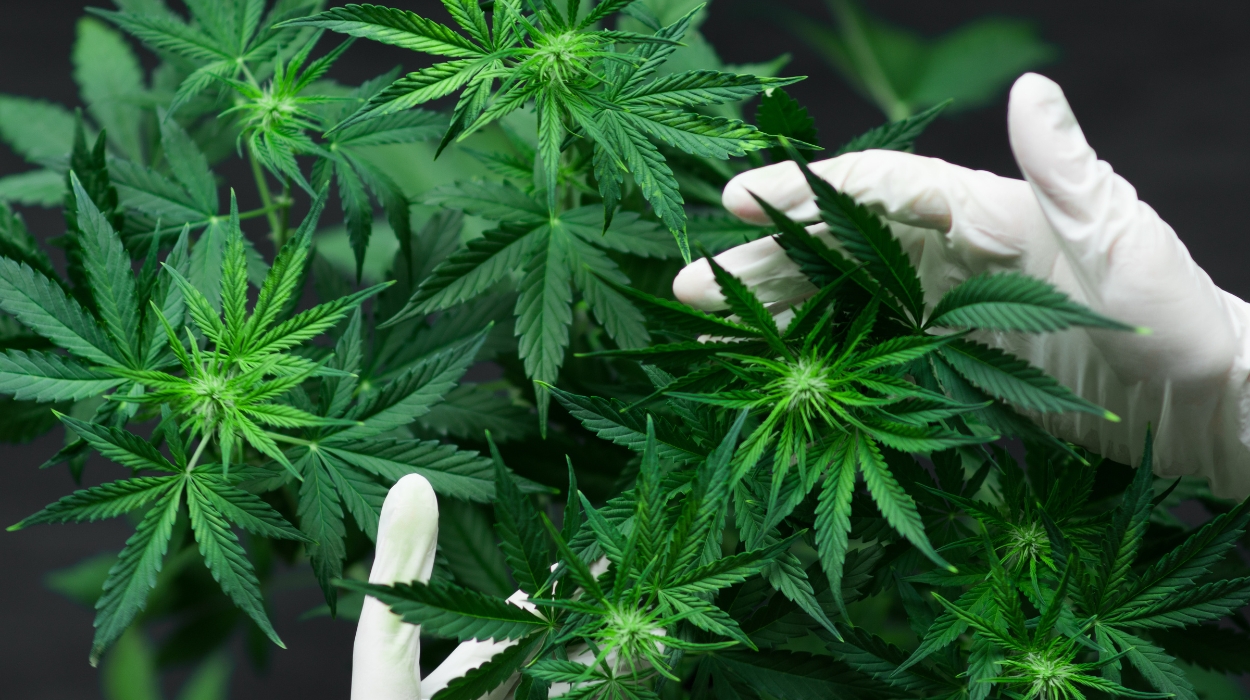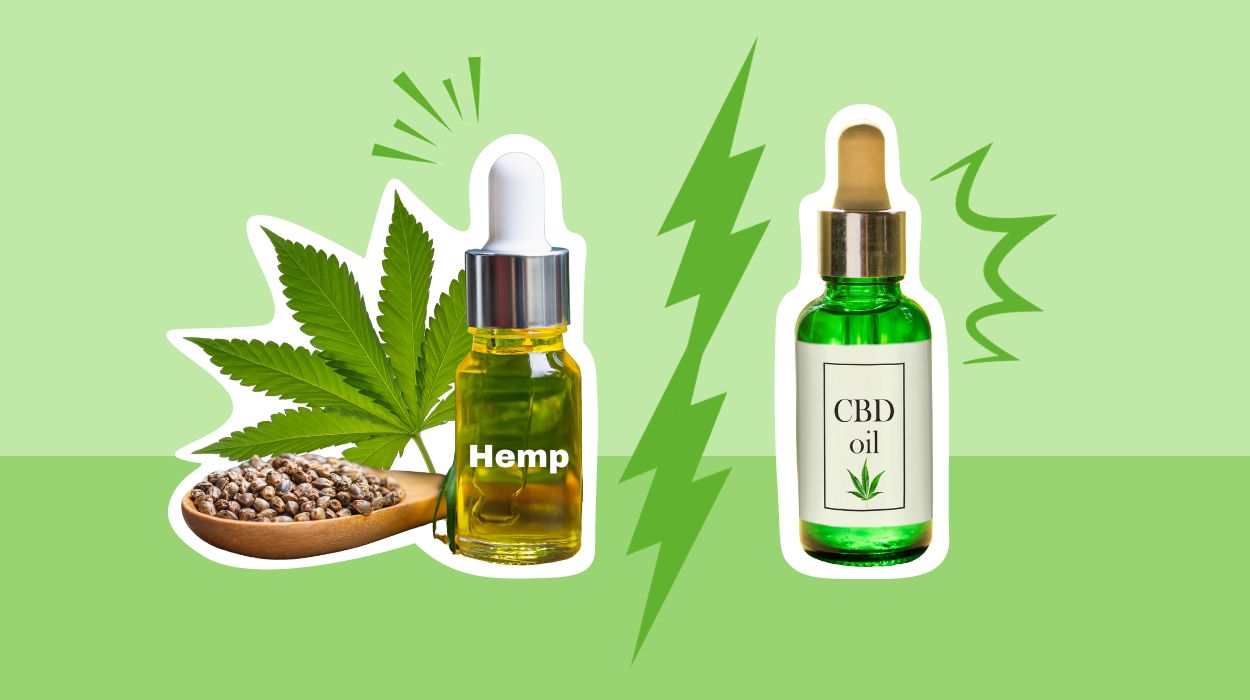Many people researching cannabis want to know the difference between hemp and CBD. Think of CBD and hemp the way you think of eggs and omelets. CBD is simply one of many ingredients found in hemp. They come from the same family of compounds. The main differences depend on whether you’re thinking about hemp seeds or plants.
Hemp seeds contain no CBD, while hemp plants have a high amount. CBD can come from non-hemp plants, like marijuana, as well as hemp plants. It must contain less than 0.3% THC weighed dry to be classified as a hemp plant. Marijuana contains more. CBD is one of many cannabinoids in hemp plants.
Differences Between Hemp And CBD
Hemp oil and CBD oil both come from the cannabis Sativa plant species. Hemp oil comes from hemp seeds. CBD oil[2] comes from hemp leaves, stalks, and flowers. You can find both kinds of oil in a lot of beauty, food, and home products.
The Entourage Effect
The entourage effect[3] is a popular theory that says you will get the best of different cannabis compounds if you take them together. In other words, they work synergistically rather than by themselves. It simply increases the chance that the benefits you seek will happen if taken together as whole plant extracts.
How It’s Derived?
You can take cannabis products in several ways, depending on your health, goals, and routines.
- Pills
Adding CBD or hemp pills to your daily supplements is rather simple. Look for brands that don’t add fillers or binders. These don’t benefit you in any way.
You also want to see that the manufacturer shows proof on the label that they’ve been tested. Finally, look for a certificate of analysis that includes potency and purity information.
- Tinctures
Taking the oil in liquid form, usually under the tongue, helps you feel the benefits quicker than taking it in pill form or as edibles. But, again, ensure it’s been tested by a reputable third party for safety. Also, avoid products that use fillers or isolated plant materials.
Note: Edibles and topical lotions won’t provide the above-referenced entourage effect.
Reliability & Regulation
Legal restrictions on cannabis[4] and its chemical constituents continue to evolve. This includes regulation relating to hemp and CBD. The more these items become available, the more people want to investigate their health claims. More manufacturers tout benefits as facts even though studies are still in their early stages.
Even though these products don’t intoxicate consumers, there are other risks. Stick with products that have been tested, marketed, and regulated, so you know what you’re getting. Look for evidence that backs up statements made regarding medical effects and avoid being led by untested information.
The legal landscape surrounding hemp and CBD can also confuse buyers. Ultimately, further research is needed to understand the real therapeutic effects of these products. However, federal regulation can help consumers feel confident about the safety, quality, and efficacy of hemp and CBD products.
After vetted and peer-reviewed research, plus subsequent regulations, users of these products can feel confident that they’re buying a product that does what it says it can do. In addition, they can better understand labels, claims, and whether or not such claims can help them.
Safe Vs. Unsafe Additives
Unfortunately, most hemp and CBD products are not regulated by the FDA. This means consumers have to do their own research and talk to their own nutritionists and doctors for guidance. They should be able to tell you what can be considered a safe additive and what should be avoided.
As a rule, you should be aware of possible dangerous ingredients, such as pesticides, heavy metals, fungi, or other bacteria.
Medicinal Uses
Both hemp oil and CBD oils are known for their medicinal qualities. People who’ve had less success with traditional medicines for certain ailments want to try other avenues of relief. Many studies continue to produce positive results. They show these products might provide relief where older products have failed.
Hemp oil may relieve constipation, diarrhea, and other gastrointestinal conditions. People have been known to take it for cardiovascular health benefits or to boost their immune system. Hemp can also improve your skin and trigger anti-aging effects reducing wrinkles or fine lines. Holistic practitioners tout hemp’s anticancer and antioxidant effects combined with plant-based diets and other measures to stay healthy.
CBD oils can sometimes relieve symptoms associated with anxiety, depression, epilepsy, and other neurodegenerative conditions. It may reduce pain and inflammation, especially with certain skin conditions. In addition, people use CBD with addiction management to stay clean and sober. More studies and research is needed, but emerging reports are very exciting for people who need these types of health-related care.
Consumption And Utility
The most common way to use hemp seed oil or CBD oil is to place it under your tongue. You can certainly add it to your favorite foods or drinks. Health food stores already supply products that use these oils as an ingredient. When putting it under your tongue, keep it there for at least a minute before swallowing.
Appearance
Flowers and plants that hold CBD and other ingredients look very similar. They have easily recognizable green buds with an occasional trichome that sparkles. They’re especially hard to tell apart because they’re grown in similar conditions.
Generally, the cannabis plant has more crystal formations. They’re deeper with a richer complexity than other flowers. Growers want to make their product more desirable, so cannabis tends to be more beautiful than a hemp flower. As hemp becomes more popular, that will probably begin to change.
Contents And Composition
As a consumer, you’d be advised to look for a product’s certificate of analysis. Also, always verify that the Delta-9 THC percentage is below 0.3%.
What Is Hemp?
Hemp can be referred to as Cannabis sativa or industrial hemp. It’s a plant, like marijuana, that comes from the cannabis family. People grow it for lots of reasons. For example, some may want to make durable fiber to be used in clothing, while others enjoy eating hemp seeds.
Cannabis plants such as marijuana or hashish contain high amounts of THC, which can induce psychoactive effects in people. Most notably, it’s a feeling of being “high”. However, THC amounts in hemp are so low they don’t cause that feeling in people who utilize or ingest it.

How Is It Made?
Hemp growers cultivate their plants and grow them outside. This is much different from marijuana, which is primarily grown inside greenhouses and other similar operations. Hemp farmers or growers go to great lengths to protect their crops from insects, diseases, and predators. The most popular technique they use is crop rotation.
Hemp farmers routinely alternate crops planted in the same location. This helps them avoid harmful organisms that might otherwise develop in that area. Instead, healthy nutrients return to the soil and keep the site free of contamination.
How Is It Used?
Hemp-made products include:
- Rope
- Clothing
- Textiles
- Shoes
- Paper
- Food
- Mulch
- Bioplastics
- Biofuel
- Insulation
- Furnishings
- Litter
- Animal Bedding
These can be 100% hemp or blended with other materials like flax, silk, cotton, or polyester. Sometimes the manufacturer can oxidize hemp oil to create paints, creams, or bird feed mix.
Potential Benefits
Hemp can provide a variety of benefits[1] for people inclined to add it to their diet or health regimen. It’s an excellent source of protein for vegetarians or vegans. In addition to containing nine amino acids, it’s also easily absorbed.
Hemp might also contribute to the following:
- Healthier Hearts
Seeds contain magnesium, which can better regulate your heartbeat and is believed to prevent heart disease. They may also reduce cholesterol and blood pressure.
- Less Inflammation
Similar to pain meds like ibuprofen, an omega-6 fatty acid prevalent in hemp seeds can reduce inflammation. It also shows promise in reducing pain for those who have arthritis.
- Better-Looking Skin
Applying hemp oil directly to your skin can relieve dryness, itchiness, and other symptoms of eczema. In addition, some dermatologists find hemp oil’s antimicrobial and anti-inflammatory properties effective in treating acne breakouts.
- Brain Health
Thanks to a rare balance of omega-6 and omega-3 essential fatty acids in hemp seeds, they seem to benefit cognition. This balance is rare in most foods. They also have terpenes, plant compounds that may protect the brain from tumors.
Potential Risks And Side Effects
Talk to your doctor before adding hemp seeds or oil to your diet. While eating them in moderation can be considered beneficial, be aware of some possible risks or side effects, such as:
- Digestion issues
- Pregnancy complications
- Medication interference
- Dependence
Conclusion
People often use the words hemp and CBD interchangeably as if they describe the same thing. They don’t. While they both come from the Cannabis Sativa plant and can be used topically or ingested, they are different. They have separate benefits and qualities depending on the consumer. Always discuss new additions to your diet or health routines with your physician.
Frequently Asked Questions
No matter how hard you exercise, your bone structure will not increase. Fortunately, you can get bigger hips by putting on muscle and fat.
No food can increase your hip width, but having a good caloric intake and exercise can help you build muscles and get a bigger butt.
Squats and lunges can help you get bigger hips.
The gluteus muscles should be targeted if you want to get wider hips.
Yes, they are exercises you should avoid if you want wide hips, some of them are woodchopped, and weighted crunch.
Keep your midsection lean and your hips muscular to get a better waist-to-hip ratio (butt and thighs). Gaining muscular mass in the shoulders is another helpful strategy for achieving an hourglass figure. Building up your upper body strength, especially your shoulders might make your waist look smaller.
Recent research published in the Journal of Orthopaedic Research found that despite the fact that most people stop growing physically taller after the age of 20, the pelvis (i.e., the hip bones) continues to widen in both men and women up to about age 80.
You may have u0022intra-abdominal obesityu0022 (extra belly fat in the abdominal cavity) if your waist circumference exceeds your hip circumference.
 Expert's opinion
Expert's opinion
